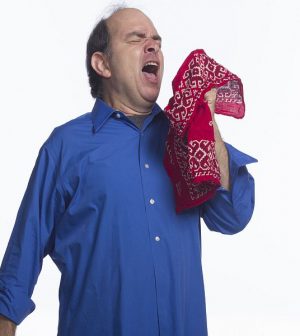- Could Your Grocery Store Meat Be Causing Recurring UTIs?
- Are You Making This Expensive Thermostat Error This Winter?
- Recognizing the Signs of Hypothyroidism
- 10 Strategies to Overcome Insomnia
- Could Artificial Sweeteners Be Aging the Brain Faster?
- Techniques for Soothing Your Nervous System
- Does the Water in Your House Smell Funny? Here’s Why
- Can a Daily Dose of Apple Cider Vinegar Actually Aid Weight Loss?
- 6 Health Beverages That Can Actually Spike Your Blood Sugar
- Treatment Options for Social Anxiety Disorder
Can You Predict Your Common Cold Risk?

How highly you rate your health could predict how likely you are to catch a cold — and, even more important, how healthy you’ll be in later years.
Scientists at Carnegie Mellon University in Pittsburgh asked 360 healthy adults to rate their health as excellent, very good, good, fair or poor — and then exposed them to a virus that causes the common cold.
Overall, about one-third developed colds. While none said “poor” and only a few said “fair,” those who rated their health as “fair,” “good” or even “very good” were more than twice as likely to develop a cold as those who described it as “excellent.”
What makes people give themselves a high health rating independent of indicators like their medical records or a doctor evaluation? Such factors include following positive lifestyle habits like regular exercise, having a strong social network and feeling a high level of emotional well-being. People who fit the bill are less likely to get sick and more likely to live longer, the researchers found.
Conversely, people who think of their health as poor tend to have a poor health trajectory as they age.
On the subject of warding off the common cold, a separate study done at Carnegie Mellon along with researchers at the University of California, San Francisco found that just one extra hour of sleep can make a difference. Sleeping less than six hours a night makes you four times more likely to catch a cold than people who get more than seven hours. Sleep less than five hours and you’re four and a half times more likely to be felled by a cold, the researchers reported.
The bottom line? Start taking steps to boost your health today … and make the first one getting a better night’s sleep.
More information
Need a refresher course on other ways to avoid the common cold? The U.S. Centers for Disease Control and Prevention has tips that will help.
Source: HealthDay
Copyright © 2026 HealthDay. All rights reserved.










